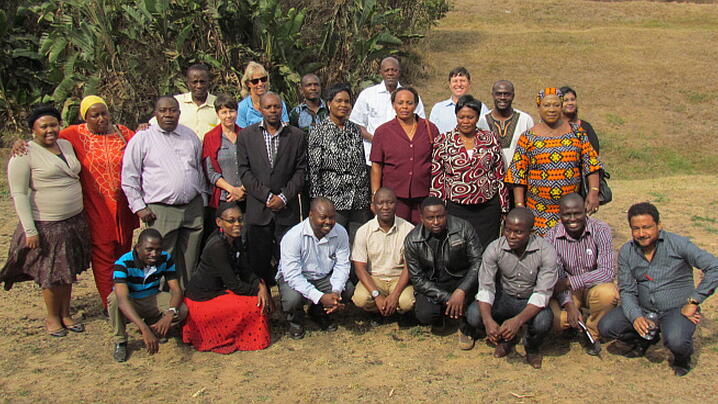
Protecting coastal assets has always been a challenge for coastal cities. This challenge has become even more pressing because of expected increases in sea level rise as a result of climate change.
Durban (South Africa) and Dar es Salaam (Tanzania), two cities located on the east coast of Africa, are now sharing lessons in coastal protection through a series of regular exchanges taking place as part of CityLinks’s support to the Durban Adaptation Charter (DAC). The DAC was initiated in 2011 as a result of the recognition of the advantages of an integrated response to climate change adaptation at a local level. There are currently over 1,100 city signatories of the DAC.
In the most recent exchange from the 4th to 6th August 2014 nineteen councillors and officials from Kinondoni Municipality visited Durban to investigate climate change adaptation responses being implemented by eThekwini Municipality, the local government of Durban. Kinondoni Municipality is one of three municipalities making up the city of Dar es Salaam.
As coastal protection is a challenge for both cities it was a key focus of the exchange, especially in light of a new project being implemented in Dar es Salaam to implement adaptation measures to reduce adverse impacts of sea level rise. The project is being implemented in response to extensive coastal erosion in Dar es Salaam that is threatening important infrastructure.

Margaret McKenzie
Erosion of coastal dune threatening Barak Obama Rd in Dar es Salaam
Dr Andrew Mather, Project Executive for Coastal Policy with the eThekwini Municipality, lead the coastal management sessions of the exchange. He introduced delegates to a range of key strategies used by eThekwini Municipality to manage its coastline that could inform the Dar es Salaam project:
Set-Back Lines: Dr Mather reported that eThekwini Municipality had determined a set-back line for the coastal zone of eThekwini Municipality. Ideally no development should take place between the set-back line and sea. However, he pointed out that considerable development had previously taken place in this zone and was now subject to a high level of risk of damage. He emphasised that coastal municipalities should prevent development in high risk zones in order to minimise both future damage to infrastructure and the need to pay for costly defensive schemes.
Shoreline Modelling: Dr Mather emphasised the need to understand the sources of sand for beach areas and how sand is supplied to beach areas. He explained that because of the disruption of the sand supply system in Durban the central beaches have to be artificially maintained via a sand pumping scheme at considerable expense the eThekwini Municipality. EThekwini Municipality has now extensively modelled its shoreline to better understand the movement of sand on and off its beaches.
Retreat Strategy: Dr Mather highlighted that retreat should always be considered as a potential strategy as it could save municipalities significant costs in the longer run. He said that retreat was particularly cost effective in the case of infrastructure that has already been damaged. The repair budget can then be allocated to breaking down the infrastructure and relocating it further back from the sea. He reported that this approach had been used effectively by eThekwini Municipality when faced with the need to rehabilitate the Isipingo Lifesavers Club which was extensively damaged in coastal storms that took place in Durban in 2007. The Isipingo Lifesavers Club which had previously been located on the high water mark was broken down and rebuilt just behind the set-back line.

Margaret McKenzie
Dr Andrew Mather explaining the use of geobags to manage coastal erosion
Soft Engineering Solutions and Dune Rehabilitation: Dr Mather indicated that soft engineering techniques should be employed where possible to protect infrastructure. EThekwini Municipality has had considerable success rehabilitating coastal dunes and the associated vegetation as it provides natural protection from the sea. The eThekwini Municipality has also made extensive use of geotextile sand containers (also known as geobags) to protect beaches from erosion. Dr Mather indicated that the geobags were preferable to hard structures which required rehabilitation if damaged. Since the geobags were filled with sand there were no negative impacts associated with damage to the bags as the sand simply spilled out onto the beach.
Other topics explored during the exchange include catchment management, biodiversity planning, wastewater and solid waste. The exchange also provided an opportunity for the two cities to agree on the next steps in promoting the regional climate change learning hub that has been established between Dar es Salaam and Durban as part of the DAC.
The exchange was primarily funded by Kinondoni Municipality with additional support from ICMA’s CityLinks program and eThekwini Municipality.
New, Reduced Membership Dues
A new, reduced dues rate is available for CAOs/ACAOs, along with additional discounts for those in smaller communities, has been implemented. Learn more and be sure to join or renew today!
